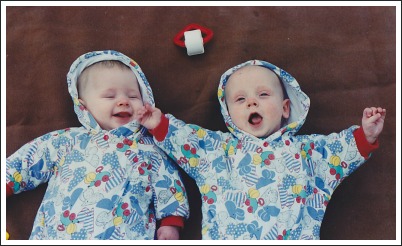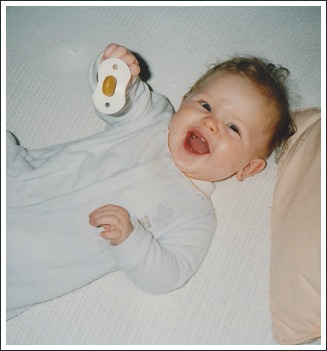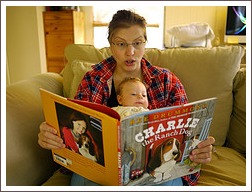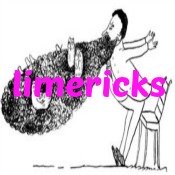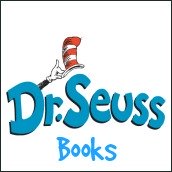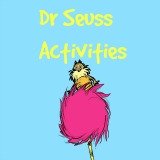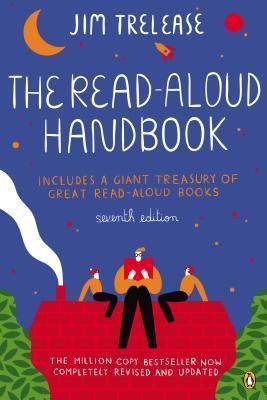You are here: home / phonological awareness / acquiring language
Acquiring Language
We know that the process of acquiring language begins at birth.
In fact, your baby's clever brain is wired for the task of learning to talk before he even enters the world.
The process of acquiring language is important because it's what makes all other learning possible. This is why learning all the skills we will need for communicating with other people throughout our lives is one of the main developmental tasks of early childhood.
Speech is part of it but so are things like taking turns in conversations, body language and eye contact when speaking or listening to someone. Believe it or not, your baby is learning all about these aspects of communication in the contacts he has with other people.
So, what has the way babies learn language got to do with books and reading?
There are lots of ways to help children develop strong language skills but there is lots of evidence that exposing them to lots of language by reading to them is one of the most important things you can do.
Why Language Skills Matter
Helping our children develop strong language skills should be a goal for all of us for two reasons:
- the evidence shows that children who start school with highly-developed language skills do better throughout their school years. This is because oral language is, for most of us, the basis of literacy;
- good verbal communication skills are the building blocks of healthy, happy relationships with other people at school, at work and in social settings;
A friend who's a speech pathologist, tells me that more and more children these days are starting school with language and speech problems.
This has a huge impact on their learning at school, on their social relationships and also on their self-confidence.
My friend works in a very affluent part of Sydney so the problem is not one of socio-economic status.
Sad but apparently true.
So how do you help your child develop strong language skills?
I'm not an expert and my husband and I are every far from being perfect parents however our three children learned to talk at a very early age. This meant that they had a head start at school and went on to do well in all subjects.
I found this process very interesting so I've done some informal research and lots of reading on the subject over the years. This year (2012) I also studied a unit called Language, Literacy and Learning at university which I found fascinating.
So here's what I've discovered about the way we humans go about acquiring language.
How Do Children Acquire Language Skills?
Long before they can speak, babies understand a great deal of the language they hear every day.
They learn to speak by hearing lots and lots of words repeatedly in meaningful sentences and questions. Over time, children internalise the language they learn so that it becomes their thinking.
This is why it's so important to engage your baby in 'conversation' from his earliest days, even though at first he won't be able to say any intelligible words.
Talking to him when you take him out and about is really important.
Naming the things he sees and talking about them will help your baby learn to talk and will encourage his efforts.
It also helps build his knowledge of the world around him.
How you speak to your child has an impact on how his speech and communication skills develop and there are some simple strategies you can use to help the process along.
Why is Hearing Lots of Different Language Important?
Children who hear fewer words and shorter sentences at home are far more likely to arrive at school with smaller vocabularies. In fact, in some cases their vocabularies are 12-14 months behind other children.
Research shows that these children have the lowest reading scores at school. They are rarely able catch up as they grow older and in fact often drop even further behind the other children in the class as time goes on.
These children are sometimes described by speech therapists and teachers as being language deprived.
On the other hand, children who arrive at school with wide vocabularies, having heard more words and longer sentences at home, usually learn to read easily and naturally and have the highest reading scores as they go through school.
How Does Reading Help With Acquiring Language?
Research shows that reading to children often and in the right way when they're young plays a vital role in helping them acquire language and vocabulary.
It also helps them learn about the world around them which is another important part of the preparation-for-reading process.
This happens because reading to children immerses them in language and exposes them to a greater number and variety of words, sentences and ideas than they would otherwise hear.
Reading is not the only way a child gains exposure to words and language but it is a very important way. The words and ideas a young child hears when an adult reads to him are different from the words and ideas he encounters in every day life.
The simple phrase ‘once upon a time’ for instance rarely comes up in everyday conversation yet it is such a rich part of our language and story-telling history.
Think too of the words contained in many nursery rhymes.
It's tempting to dismiss nursery rhymes as old fashioned but hearing the kind of language they contain is an important part of the language acquisition process.
It adds to the richness of your child's vocabulary, encourages speech development and will mean he has a head start when he begins to learn to read at school.
References:
Emmitt, M; Zbaracki, M; Komesaroff, L; & Pollock, J. (2010). Language & Learning. Melbourne: Oxford University Press.
